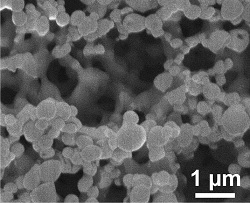 |
| A nano-network of insulin-carrying particles--Courtesy of NC State |
Researchers from several U.S. institutions have created a 'smart' nanoparticle for insulin delivery that reacts to changes in blood chemistry and releases the protein when needed for up to 10 days at a time.
The team of scientists from North Carolina State University, University of North Carolina at Chapel Hill, MIT and Children's Hospital Boston developed an injectable mixture of nanoparticles with a solid core of insulin, modified dextran and glucose oxidase enzymes that, when exposed to high levels of blood sugar, break down and release their payload to keep glucose levels under control, according to a release from NC State.
The triggered release works because the tiny nanoparticles stick together in what is known as a "nano-network" via opposite charges when blood sugar levels are normal. When those levels rise, though, the charges are dispersed, the network broken and insulin released. These charges come from the coatings of each individual particle--chitosan, a material found in shrimp shells, forms a positive charge, and alginate, a material found in seaweed, forms a negative charge. The opposite charges then form clusters that keep the network intact until needed.
"This technology effectively creates a 'closed-loop' system that mimics the activity of the pancreas in a healthy person, releasing insulin in response to glucose level changes," said lead author Zhen Gu in a statement. "This has the potential to improve the health and quality of life of diabetes patients."
The nanoparticles were able to maintain normal blood sugar levels for up to 10 days in animal trials, according to the study published in ACS Nano, and Gu and his team, which includes MIT's professor and entrepreneur Robert Langer, are in discussions to begin human clinical trials.
A few years ago, Merck ($MRK) bought out MIT-based SmartCells, which originated the concept of 'smart' insulin. The deal included $500 million upfront and potential milestone payments.
- here's the release